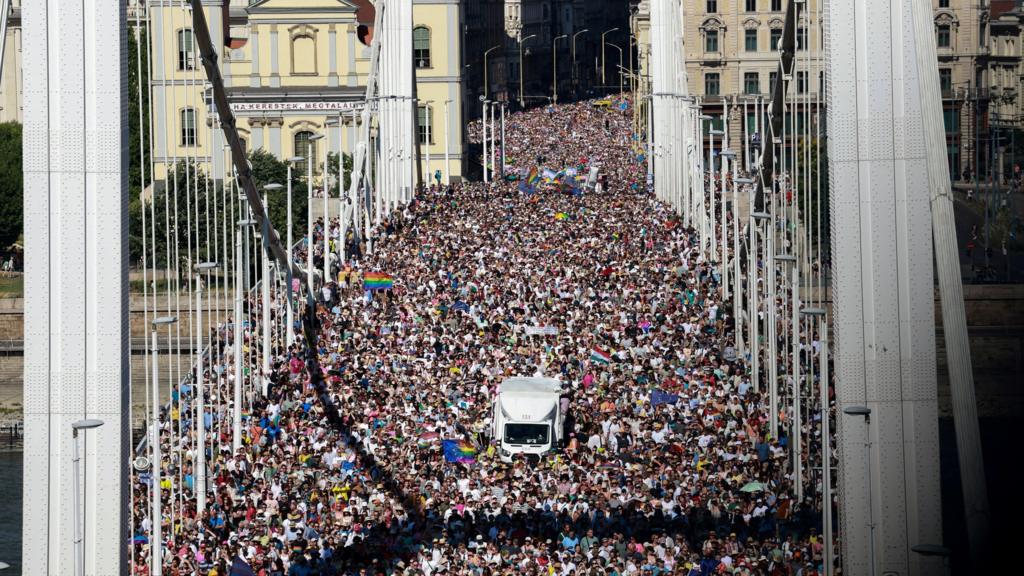“`html
Tens of thousands have participated in the Budapest Pride march, in a display of defiance against Hungarian Prime Minister Viktor Orban’s legal challenges to LGBTQ rights advocacy.
Organizers anticipated record attendance for the event, despite heightened pressure from nationalist conservative politicians and police aimed at suppressing pro-LGBTQ expressions.
Law enforcement implemented a ban in accordance with a recently enacted “child protection” law, which restricts gatherings perceived as promoting homosexuality. One attendee stated her motivation stemmed from a desire for a “diverse” society for her children.
While Prime Minister Orban dismissed the likelihood of violent confrontations between authorities and march participants, he cautioned of potential legal ramifications for those involved.
“Of course, the police could break up such events, because they have the authority to do so, but Hungary is a civilised country, a civic society. We don’t hurt each other,” he stated in a Friday address on state radio.
“There will be legal consequences, but it cannot reach the level of physical abuse.”
Participants face potential fines of up to €500 (£427; $586), with law enforcement authorized to employ facial recognition technology for identification purposes.
Event organizers could be subject to imprisonment for up to one year.
Luca, 34, planning to attend with her mother, Enikö, expressed their aspiration for a nation characterized by “diversity,” which she believes is currently lacking.
“We have a law that bans people who are different from others to gather. This is why we are here. Because it’s hurting our rights. That’s why we came.”
Speaking to the BBC, she conveyed concerns regarding her four-year-old daughter’s future prospects in “a country where she can’t love anyone she wants to”.
Barnabás explained his attendance as an act of solidarity with the LGBTQ community, stating, “I know what it feels like not being seen and to be treated like an outcast, which obviously everyone here is not”.
The 22-year-old, who does not identify as part of the community, shared that he is from a rural area where “people are more likely to be xenophobic and homophobic”.
EU equalities commissioner Hadja Lahbib, formerly Belgium’s foreign minister, is present in Budapest and is expected to participate in the march.
On Friday, she shared a photograph on X, depicting her alongside Budapest’s liberal mayor, Gergely Karacsony, in front of a rainbow flag – a symbol of gay rights.
She stated on X that the Pride march “will be a powerful symbol of the strength of the civil society”.
Numerous Members of the European Parliament (MEPs) were also anticipated to be present.
Finnish MEP Li Andersson conveyed the importance of her and her European colleagues’ presence in demonstrating solidarity with both Hungary’s LGBTQI community and its civil society.
“It’s important to emphasise that the reason why we are here is not only Pride – this is about the fundamental rights of all of us.”
She suggested that Orban’s arguments regarding family values serve as a pretext for prohibiting the march.
“[It’s] a march that is fundamentally about equality and about equal rights for anyone – for everybody, about the right to love and live with whoever you choose.
“And I think that’s a core value that any free and democratic society should respect.”
Karacsony, a member of Hungary’s opposition, has asserted that attendees of the march will not face repercussions, as the event is co-organized by the city hall and, as such, constitutes a municipal event not requiring police authorization.
Prior to the Pride event, European Commission President Ursula von der Leyen urged the Orban government not to impede the march.
Orban responded by requesting that she “refrain from interfering in the law enforcement affairs” of EU member countries.
“`

